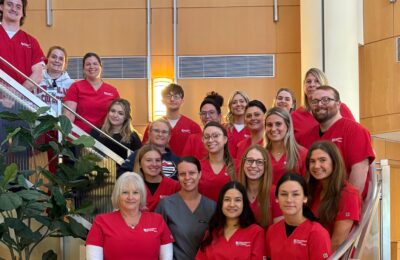Breaking New Ground in Nursing
This article appeared in the Spring 2022 issue of the New England College Magazine.
It is not an exaggeration to say that nurses form the backbone of the modern healthcare system, especially in hospital settings, where nurses provide around-the-clock care for patients. Moreover, these nurses are often asked to take on more and more responsibility as healthcare becomes increasingly complex and the system continues to face staffing shortages. New England College has long planned to launch a bachelor’s-level nursing degree program to prepare students to meet these workplace challenges. That plan becomes a reality for the fall 2022 semester with a three-year cooperative Bachelor of Science in Nursing (BSN).
Designing an Innovative Program
When Karen Scolforo, Associate Vice President of Enrollment and Program Development, joined NEC in November 2020, her role included developing new academic programs for the College. That process often led to conversations with other organizations across the state to discuss workforce needs. During a conversation with hospital leaders, she learned two key things. One, hospitals in New Hampshire cannot find enough nurses, especially those trained at the bachelor’s level, to fill all their open positions. Two, hospitals have established partnerships with other higher education institutions for six- to eight-week clinical rotations. Still, nursing students have not been staying to work in the state’s hospitals. Scolforo recognized that NEC needed a way to move bachelor’s-level nursing students into the workforce more quickly than traditional academic models. NEC needed an innovative, three-year cooperative model.
“I launched a similar model when I worked at a previous institution, and I fostered the design process at NEC,” Scolforo stated. “Our three-year model offers a complementary approach by combining classroom learning on our Henniker campus and immersive clinical experiences at Concord Hospital, our inaugural partner hospital.”
Scolforo explained how this innovative model works. Students begin the program by attending their first two trimesters of classes. They then become employees of Concord Hospital, working 36 hours a week as licensed nursing assistants (LNA) during a 14-week immersive clinical experience. For the duration of the BSN program, students will toggle between the classroom and clinical environments. This approach allows students to apply what they have learned immediately, advance their skills, and graduate faster.
For its part, Concord Hospital knows that NEC’s nursing students will provide a year-round workforce. First-year students will work at the hospital during the summer, second-year students in the spring, and third-year students in the fall.
“By the time students graduate, they will have worked in the hospital for three years,” Scolforo pointed out. “They will have formed connections and become acclimated to the hospital’s culture.
Scolforo also learned in her conversations with hospital leaders that it typically takes nine months for a new nurse to become acclimated to the culture. As a result, BSN students who spend three years working at Concord Hospital will be more likely to stay as full-time employees when they graduate, helping reduce staffing shortages.
Addressing the Nursing Shortage
A former critical care nurse, Dr. Angela McPhee-Smith, DNP, RN—Associate Dean of Nursing and Health Professions and Associate Professor of Nursing—has witnessed the nursing shortage for over 22 years as a nurse. From an academic perspective, the shortage, she says, in part stems from entrance-to-graduation taking four to five years and programs capping enrollment due to limited access to clinical placements and availability of clinical faculty. There is also a scarcity of qualified nurse educators due to the need to hold a terminal degree in nursing while often being paid less than their students in practice environments.
“By design, NEC’s innovative three-year cooperative BSN helps overcome some of the hurdles to getting students into nursing programs and then out into clinical settings more efficiently,” stated McPhee-Smith. “In our program, students will graduate in less than three years. As a true academic-practice partnership, NEC and our practice partners will share in the responsibility of educating nurses to address the complexities of the 21st-century healthcare delivery system.”
In addition to the academic barriers she sees, McPhee-Smith notes that high retirement rates among nurses also cause staffing shortages. In New Hampshire, the average age of nurses is 46 or older, which has come down from a previous average age of 55. As a result, nursing schools cannot keep up with the demand caused by older nurse populations heading into retirement. In addition, the COVID-19 pandemic has moved RN job vacancy rates in New Hampshire from 12.8% in 2019 to nearly 24% in 2022.
McPhee-Smith also points out that the nursing field struggles with high turnover rates in the first year of employment. In traditional nursing programs, students move from one six- to eight-week clinical placement to another. When they graduate, they either move away or accept a position in a hospital from their clinical placements. However, because students spent so little time at each placement, they never became part of the organization or culture. As a result, they may not have gained a realistic expectation of the clinical setting, leading to shellshock.
NEC built the first-year nursing experience into its BSN program. Students must be LNAs before the first immersive hospital experience during the summer of their first year in the program. As LNA employees of Concord Hospital, these first-year students are also introduced into the nursing workforce. Students will have an immediate impact on workforce needs; understand the hospital’s policies and procedures; work in different departments; and over their three years at the hospital, gain a solid understanding of what it means to be a nurse, resulting in less turnover due to shellshock.
Focusing on Student Success
As with all its students, NEC wants to help its nursing students find success in the classroom and beyond. That starts with competitive scholarships that have been designed for this specific program.
Admitted students will be placed into cohorts and move through the program together. “Research shows that students in a cohort tend to be highly successful and supportive of each other and have a much better overall experience,” Scolforo commented.
The College is also considering the addition of nursing-specific housing so that students can live and learn with others who understand the need to be professional and focused.
And, of course, there is the liberal arts component. “This program combines elements of the nursing diploma program, like teaching hospitals used to offer, with a liberal arts education,” Scolforo stated. “It’s a beautiful match that gives students the skillset to become excellent nurses and nurse leaders who are ready to hit the ground running as soon as they graduate.”
The liberal arts curriculum, Scolforo and McPhee-Smith agree, is critical to the program. Critical thinking, problem-solving, thinking on their feet—these are the soft skills nurses need that a liberal arts education provides.
Opening More Doors for Nurses
McPhee-Smith notes that as more and more hospitals want bachelor’s-level nurses, many nurses with a diploma or associate degree are going back to school. As a result, BSN-educated nurses focus more on evidence-based practice and leadership. They learn to identify a problem, look at the evidence, work at effecting change, and test hypotheses. This process leads to better patient outcomes.
A BSN also opens up more professional opportunities for nurses. Those who pursue their BSN receive more public and mental health training and are more prepared for leadership and management roles. For example, they can work with the Veterans Administration, which only hires BSNs and above; go into the military as officers; or be better positioned for higher education paths like nurse practitioner or nurse anesthetist.
Forming True Partnerships
The process of creating NEC’s new BSN program has been marked by collaboration and partnership. “This model evolved through our conversations with NEC’s leadership and their openness to making modifications along the way,” Scolforo stated. “The model morphed again through our conversations with Concord Hospital. This program is a true representation of partnership, and I think we’re all really proud of that.”
NEC and Concord Hospital will collaborate, as leaders from both organizations will serve on the BSN admission council. McPhee-Smith; Patricia Corbett (NEC’s Dean of Undergraduate Programs); Erin Collins, RN (Vice President of Nursing at Concord Hospital); and Patrick Boyle (Chief Human Resources Officer at Concord Hospital) will interview applicants and determine cohort assignments each year.
“This program will build confidence in students because they will be learning at the bedside in their first year, working alongside other healthcare professionals, and building on their LNA skills,” Scolforo added. “Because this is a high-demand program, we are in the process of talking with several other hospital systems. There is potential to replicate this program and model beyond our state and region. I believe we will have a lot of partners.”
Learn More
Apply to NEC
Insight and Action: NEC’s New Three-Year BSN Program
Bachelor of Science in Nursing
Online RN to BSN Program
Nursing and Healthcare Programs
Career Outlook Is Bright for Health Professionals





